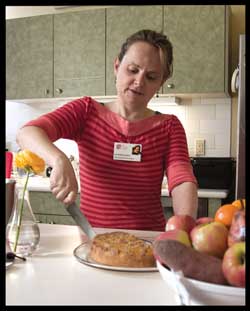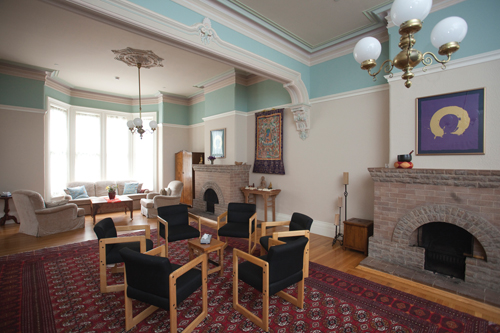 So many deaths I have been a part of, so many patients, families, caregivers, and volunteers have touched my life. Together we’ve created a kind of peaceful revolution whose battle cry is as quiet and profound as two strangers holding hands before death. We’ve gone to the edge of our fear of death, of our curiosity, of our longing to befriend it and have it teach us. We have discovered that dying is deeply disturbing, painful, sad; and that it is the mysterious source of all radiance.
So many deaths I have been a part of, so many patients, families, caregivers, and volunteers have touched my life. Together we’ve created a kind of peaceful revolution whose battle cry is as quiet and profound as two strangers holding hands before death. We’ve gone to the edge of our fear of death, of our curiosity, of our longing to befriend it and have it teach us. We have discovered that dying is deeply disturbing, painful, sad; and that it is the mysterious source of all radiance.
—Martha deBarros, co-founder of Zen Hospice Project
Founded in 1987, as the AIDs epidemic overwhelmed the city of San Francisco, the Zen Hospice Project began as a program of the San Francisco Zen Center under the direction of Frank Ostaseski, a Buddhist teacher who has made it his life’s work to bring compassion and mindfulness to end-of-life care. Zen Hospice’s compassionate approach to facing death openly has alleviated the suffering of many terminally ill patients.
Since its inception, Zen Hospice has blossomed from a small program that provided services to cancer patients living in the streets of San Francisco into a well-established hospice-care organization. It now has its own 6-bed guesthouse in downtown San Francisco and sends volunteers to a 30-bed unit in nearby city-run Laguna Honda Hospital. Both facilities provide 24-hour care with on-site nurses and nonprofessional hospice volunteers.
The foundation of Zen Hospice’s mission is rooted in Buddhism, but Dr. B. J. Miller, the current executive director of Zen Hospice Project, notes that the project’s scope goes beyond religion. “A life ending, and pondering one’s life ending, is an extraordinarily profound human endeavor that is very much rooted in Buddhism,” he said. But “we’re interested in humans taking care of humans. We’re interested in affecting the culture, and spirituality is a means to that end.”
Under Miller’s guidance, Zen Hospice Project has set for itself the goal of transforming society’s phobia of death through open awareness and kindness. Instead of turning away from the dying, Zen Hospice encourages patients and volunteers to look inward toward their own mortality. This more abstract approach to openness, Miller says, has concrete benefits in easing patients’ depression, anxiety, and pain, in addition to prolonging their life. It also helps the volunteers deal with the prospect of their own death.

Zen Hospice relies on the help of some 150 active volunteers, many of whom have been with the project for over a decade. Before working with patients, volunteers go through a rigorous 40-hour training program that brings them face-to-face with mortality through workshops and meditation exercises. During training, volunteers discuss their own fear of death and dying, which allows them to open themselves up to the end-of-life process. Once they have completed training, volunteers support the hospice patients by giving back rubs, delivering carefully prepared meal trays of organic food, reading aloud, speaking with patients’ family members, listening to patients’ stories, and sharing their own stories. Most importantly, the volunteers make a commitment not to turn away from the patients’ suffering but to meet it with compassion, understanding, and honesty.
“We owe it to our patients to provide them with the truth as we know it, and to support them as they ponder that truth, and not to abandon them,” said Miller. “I see it over and over again. In the end, the truth always helps them. We’re sitting on something of a secret: we can help people in ways that health care alone cannot.”
As Zen Hospice looks toward the future, Miller says he is excited about the increasing outreach of the organization. The project is partnering with Upaya Zen Center in Santa Fe this coming winter to provide a training curriculum to health care professionals who work with dying patients. There are also plans for Zen Hospice to host public awareness programs that raise consciousness about death through art and to bring contemplative-based hospice care into patient homes, nursing homes, and prisons. And Miller hopes to build a larger, multi-use center in a few years. “It would be a monument to our cause,” he said, “a monument to the fact that not only does everyone die and everyone suffer, but that there’s all this human beauty to it. Part of our culture’s problem is that it doesn’t pay attention to mortality. We really want to give people an excuse to pay attention.”
Thank you for subscribing to Tricycle! As a nonprofit, we depend on readers like you to keep Buddhist teachings and practices widely available.